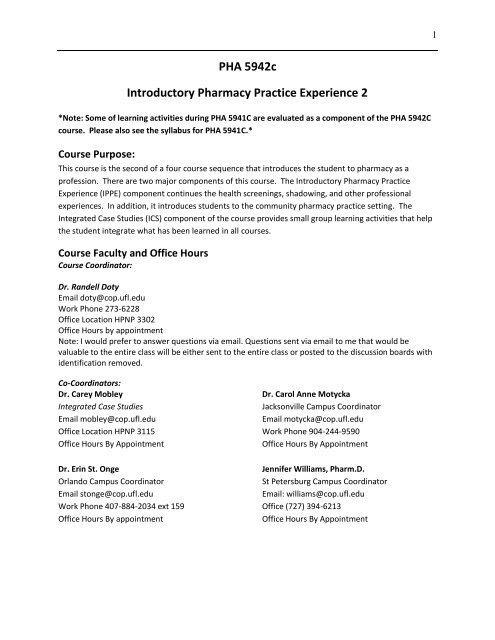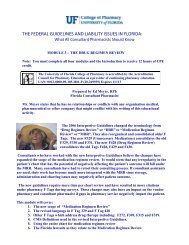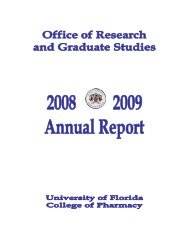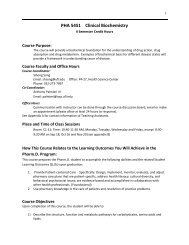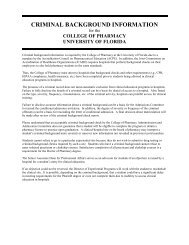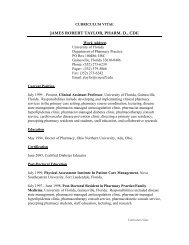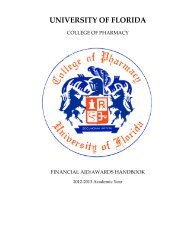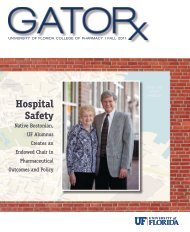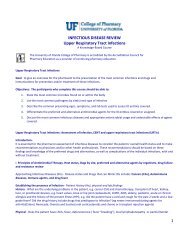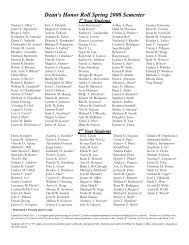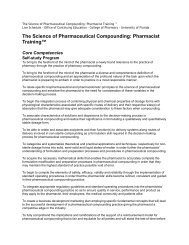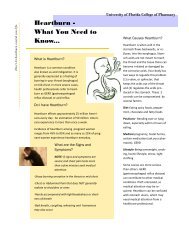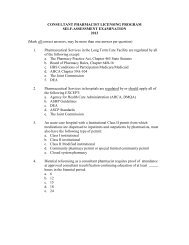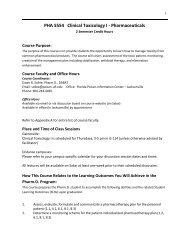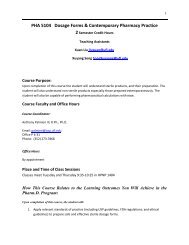PHA 5942c - College of Pharmacy
PHA 5942c - College of Pharmacy
PHA 5942c - College of Pharmacy
You also want an ePaper? Increase the reach of your titles
YUMPU automatically turns print PDFs into web optimized ePapers that Google loves.
<strong>PHA</strong> <strong>5942c</strong><br />
Introductory <strong>Pharmacy</strong> Practice Experience 2<br />
*Note: Some <strong>of</strong> learning activities during <strong>PHA</strong> 5941C are evaluated as a component <strong>of</strong> the <strong>PHA</strong> 5942C<br />
course. Please also see the syllabus for <strong>PHA</strong> 5941C.*<br />
Course Purpose:<br />
This course is the second <strong>of</strong> a four course sequence that introduces the student to pharmacy as a<br />
pr<strong>of</strong>ession. There are two major components <strong>of</strong> this course. The Introductory <strong>Pharmacy</strong> Practice<br />
Experience (IPPE) component continues the health screenings, shadowing, and other pr<strong>of</strong>essional<br />
experiences. In addition, it introduces students to the community pharmacy practice setting. The<br />
Integrated Case Studies (ICS) component <strong>of</strong> the course provides small group learning activities that help<br />
the student integrate what has been learned in all courses.<br />
Course Faculty and Office Hours<br />
Course Coordinator:<br />
Dr. Randell Doty<br />
Email doty@cop.ufl.edu<br />
Work Phone 273-6228<br />
Office Location HPNP 3302<br />
Office Hours by appointment<br />
Note: I would prefer to answer questions via email. Questions sent via email to me that would be<br />
valuable to the entire class will be either sent to the entire class or posted to the discussion boards with<br />
identification removed.<br />
Co-Coordinators:<br />
Dr. Carey Mobley<br />
Integrated Case Studies<br />
Email mobley@cop.ufl.edu<br />
Office Location HPNP 3115<br />
Office Hours By Appointment<br />
Dr. Erin St. Onge<br />
Orlando Campus Coordinator<br />
Email stonge@cop.ufl.edu<br />
Work Phone 407-884-2034 ext 159<br />
Office Hours By appointment<br />
Dr. Carol Anne Motycka<br />
Jacksonville Campus Coordinator<br />
Email motycka@cop.ufl.edu<br />
Work Phone 904-244-9590<br />
Office Hours By Appointment<br />
Jennifer Williams, Pharm.D.<br />
St Petersburg Campus Coordinator<br />
Email: williams@cop.ufl.edu<br />
Office (727) 394-6213<br />
Office Hours By Appointment<br />
1
Place and Time <strong>of</strong> Class Sessions<br />
Class lecture times are 3:00pm on Monday afternoons.<br />
Experiential portions <strong>of</strong> the class will happen at various times during fall semester in small groups.<br />
How This Course Relates to the Learning Outcomes You Will Achieve in the<br />
Pharm.D. Program:<br />
This course prepares the Pharm.D. student to accomplish the following abilities and the related Student<br />
Learning Outcomes (SLOs) upon graduation:<br />
1. Provide patient-centered care. Specifically, Specifically: Design, implement, monitor, evaluate,<br />
and adjust pharmacy care plans that are patient‐specific; address health literacy, cultural<br />
diversity, and behavioral psychosocial issues; are evidence‐based and accomplished in<br />
collaboration with other health pr<strong>of</strong>essionals. (SLO 1.1)<br />
2. Provide population health by promoting effective drug use and disease prevention/wellness.<br />
(SLO 2.3)<br />
3. Perform pharmacist responsibilities within the medication use system and relate to the larger<br />
health care systems to assure safe and quality patient care (SLOs 3.1-3.4)<br />
4. Communicate effectively with patients, caregivers, peer pharmacists, other pharmacy staff, and<br />
other health pr<strong>of</strong>essionals. (SLOs 4.3, 4.5 and 4.6)<br />
5. Use pharmacy knowledge in the care <strong>of</strong> patients and resolution <strong>of</strong> practice problems. (SLO 6.2)<br />
6. Demonstrate ethical behaviors and adhere to legal requirements in pharmacy practice. (SLO 7.2)<br />
7. Solve complex practice problems (both patient-specific and general practice) using an evidencebased<br />
approach, other aspects <strong>of</strong> good clinical science, and informatics. (SLO 8.1)<br />
8. Demonstrate pr<strong>of</strong>essional behaviors (i.e., UF PharmD CORES), appropriate personal traits, selfdirected<br />
and lifelong learning abilities, and leadership. (SLO 9.1)<br />
Course Objectives<br />
Upon completion <strong>of</strong> the IPPE component <strong>of</strong> this course, the student will be able to:<br />
Conduct a screening program and/or and educational program for the community including<br />
documentation <strong>of</strong> their activities in one or more <strong>of</strong> the following areas<br />
Diabetes risk<br />
Nutritional status<br />
Cardiac risk<br />
Osteoporosis risk<br />
Knowledge <strong>of</strong> household poisoning risks<br />
Medication taking behaviors<br />
Need for preventative vaccinations<br />
School health preventative screenings<br />
Communicate the major points necessary to educate a patient concerning the results <strong>of</strong> a<br />
community-screening program including when to refer for further assessment.<br />
Demonstrate in written form an understanding <strong>of</strong> the roles and responsibilities <strong>of</strong> the senior<br />
2
pharmacy student in the provision <strong>of</strong> pharmaceutical care.<br />
Demonstrate the pr<strong>of</strong>essional demeanor necessary to practice as a pr<strong>of</strong>essional pharmacist.<br />
Understand the role <strong>of</strong> the Florida Board <strong>of</strong> <strong>Pharmacy</strong> and the purpose <strong>of</strong> regulations and laws by<br />
attending an actual board <strong>of</strong> pharmacy session.<br />
Participate in completing pharmacist responsibilities in the community pharmacy practice setting.<br />
Specifically:<br />
Participate in all areas <strong>of</strong> the medication use system (prescription receipt, order processing,<br />
dispensing, administration, and patient monitoring) and understands the importance <strong>of</strong> safe,<br />
accurate, and time-sensitive delivery <strong>of</strong> medications.<br />
Assist in the preparation <strong>of</strong> medications for patients (i.e., performs basic calculations,<br />
establishes a patient pr<strong>of</strong>ile, evaluates dosing appropriateness using basic dosing).<br />
Understand how the responsibilities <strong>of</strong> a staff pharmacist differ from those <strong>of</strong> the pharmacy<br />
manager and technicians.<br />
Understand the physical resources and computer technologies needed to operate a community<br />
pharmacy practice and how drug products are acquired.<br />
Understand how to prevent, identify, report, and analyze medication errors and adverse<br />
reactions.<br />
Interview patients to gather basic health/medication information.<br />
Counsel patients about only the most common nonprescription and prescription medications.<br />
Assess health literacy and adherence/compliance.<br />
Communicate with health pr<strong>of</strong>essionals to clarify prescriptions.<br />
How third parties are billed and can assist in resolving billing problems.<br />
Display ethical and moral values when dealing with colleagues and patients.<br />
Comply with federal and state statutes and regulations affecting community practice.<br />
Upon completion <strong>of</strong> the IPPE component <strong>of</strong> this course, the student will be able to:<br />
Apply general reasoning skills (including induction and deduction) to the patient care planning<br />
process.<br />
Use a medmap for comprehensive understanding <strong>of</strong> how a disease affects a patient (from a basic<br />
sciences perspective)<br />
Give a verbal presentation and contribute to patient case discussions that integrate curricular<br />
concepts.<br />
During the presentation, the individual student is expected to demonstrate:<br />
Subject knowledge<br />
Effective presentation skills<br />
Use appropriate references<br />
Use audiovisual materials appropriately<br />
Develop an understanding <strong>of</strong> how insights from the different curricular disciplines, including the<br />
natural and social sciences, can illuminated and inform an integrated understanding <strong>of</strong> the<br />
patient and patient care.<br />
Develop an appreciation <strong>of</strong> how an integrated understanding <strong>of</strong> the patient – forged with<br />
relevant disciplinary insights – can lead to a more accurate and comprehensive understanding <strong>of</strong><br />
patients and their problems, and can thus make more effective action possible.<br />
Discover how insights from different health-related pr<strong>of</strong>essions can integrate with<br />
pharmaceutical care to produce a more holistic understanding <strong>of</strong> patient care.<br />
Demonstrate some <strong>of</strong> the skills and traits important to collaborative practice and/or to achieve<br />
an interdisciplinary understanding.<br />
3
Demonstrate basic skills <strong>of</strong> patient care planning, including those common to medication<br />
therapy management and the pharmacotherapy workup. (eg, how to gather patient information<br />
and identify basic medication-related problems)<br />
Pre-Requisite Knowledge and Skills<br />
As these courses are first year courses, students will need a good base from their pre-pharmacy<br />
coursework, specifically Public Speaking, Anatomy and Physiology, and their Chemistry sequence.<br />
Course Structure & Outline<br />
Course Structure.<br />
<strong>PHA</strong> 5942C is the second experiential course in the curriculum and is a hybrid lecture/lab course<br />
sequence.<br />
Class meetings will be conducted to prepare students for the experiential activities that are the heart <strong>of</strong><br />
the course. Class meetings that are necessary for training for all campuses will be video captured and<br />
made available via the Electronic Learning System. Learning activities are video lectures and students<br />
are required to come to campus for exams.<br />
There will be several required small group sessions for the course where the students will meet on their<br />
individual campus.<br />
There are also learning activities that are experiential in nature which will require the student to be <strong>of</strong>f<br />
campus where the patient activities are occurring.<br />
Course Outline/Activities.<br />
The components <strong>of</strong> this course are:<br />
Course Lectures.<br />
Lectures for the course will be posted on the course Calendar and approximate dates are listed in<br />
appendix B<br />
Community Health Screenings.<br />
Students must participate in four, 2-hour programs in the community during <strong>PHA</strong> 5941C and/or 5942C.<br />
(Students have the flexibility to schedule these anytime during the year, depending on the logistical<br />
limitations <strong>of</strong> their specific campus.) Students are given an orientation to the screening type as well as<br />
training for any necessary skills to be used at the screenings as part <strong>of</strong> the course. They are supervised<br />
by one <strong>of</strong> their clinical faculty preceptors during the program. The types <strong>of</strong> programs that will be<br />
<strong>of</strong>fered are:<br />
Osteoporosis<br />
Hypertension<br />
4
Diabetes<br />
Poison information<br />
Heartburn awareness<br />
Brown bag medication reviews<br />
Others as opportunity presents<br />
After each screening students will complete a short reflective paper on their experience.<br />
Advanced <strong>Pharmacy</strong> Practice Experience Shadowing.<br />
Students must complete 2 8-hour shadowing experiences during <strong>PHA</strong> 5941C and/or 5942C. (Students<br />
have the flexibility to schedule these anytime during the year, depending on the logistical limitations<br />
<strong>of</strong> their specific campus.) Each semester students are matched up with senior students currently on<br />
APPE rotations in the area by their campus coordinator. Students will set up an appointment to spend<br />
time with the senior students on their rotation to see what it is like. Afterward, they will write a<br />
reflective report describing their experiences that they will submit to their clinical faculty preceptors for<br />
review. Please see the specific documentation on the Sakai site for more details.<br />
Integrated Case Studies.<br />
Students, in groups, research and present topics from case studies designed to bring the knowledge they<br />
are learning from all <strong>of</strong> their courses together. These will be on-campus classroom activities.<br />
Class Participation<br />
Students are required to participate in class preparations for the other events <strong>of</strong> the course as well as in<br />
class events to broaden their exposure to health care and pharmacy. The required events are:<br />
Attendance at a Florida Board <strong>of</strong> <strong>Pharmacy</strong> Meeting once during the year<br />
Reflection papers covering events.<br />
Community Service Requirement.<br />
Students must participate in 8 hours <strong>of</strong> community service during 5942C. (Students have the flexibility<br />
to schedule these anytime during the year, so long as it is completed before the end <strong>of</strong> <strong>PHA</strong><strong>5942c</strong>.) The<br />
type <strong>of</strong> community service is up to the student. It does not have to be health focused although there<br />
may be increased value in that. The only requirements are that it is Service (meaning you are not paid<br />
and it provides value) and that it is for the Community at large (meaning that the benefit <strong>of</strong> the service is<br />
not primarily for yourself, family organization or our <strong>College</strong>). Please see the specific documentation on<br />
the Sakai site for more details<br />
Community Practice Requirement.<br />
5
ALL students must complete the Community Practice IPPE requirement before they can register for their<br />
IPPE 3 & 4 experiences in the fall <strong>of</strong> their 2nd year. Documentation regarding the details <strong>of</strong> the<br />
requirement and how to document it can be found on the IPPE 1& 2 course site via the Community<br />
Practice Requirement Manual. You have until Mid August prior to your 2nd year <strong>of</strong> coursework to<br />
complete this requirement. The exact deadline will be set via the Sakai site. Please see the specific<br />
documentation on the Sakai site for more details<br />
Please see the appendix B for more detail on each <strong>of</strong> these activities.<br />
Textbooks<br />
Clinical Skills for Pharmacists: A Patient-Focused Approach 2 nd ed. by Karen J. Tietze ISBN 0323024734<br />
/ 9780323024730 / 0-323-02473-4 Publisher Mosby Inc<br />
Active Learning Requirements<br />
All lab, small group and all experiential requirements <strong>of</strong> this course require active learning. Attendance<br />
and participation is mandatory for these events.<br />
6
Student Evaluation & Grading<br />
Grade determination will be made by the following criteria:<br />
Completion <strong>of</strong> the required assignments for each semester (family encounter assignments,<br />
community programs, shadowing experiences)<br />
Submission <strong>of</strong> reports <strong>of</strong> listed assignments for each semester<br />
Faculty satisfaction with performance and level <strong>of</strong> pr<strong>of</strong>essional conduct exhibited during the<br />
events and activities<br />
Attendance (certain classroom sessions and all discussion sessions are mandatory and pro<strong>of</strong> <strong>of</strong><br />
attendance will be collected)<br />
Specific Grading Criteria:<br />
IPPE 2 Summer Semester *See note regarding timing<br />
Item/Activity Timeframe for Completion Points Allocated<br />
Integrated Case Studies<br />
Community Practice Req.<br />
Community Service<br />
Community Screenings x2<br />
APPE Shadowing x1<br />
Class participation:<br />
FBOP meeting<br />
Reflections<br />
<strong>PHA</strong> 5942C requirements should be completed by end<br />
<strong>of</strong> Spring Semester.<br />
May be completed during either <strong>PHA</strong> 5941C or 5942C.<br />
(Students have the flexibility to schedule these anytime<br />
during Fall/Spring/Summer Semesters.)<br />
May be completed during either <strong>PHA</strong> 5941C or 5942C.<br />
(Students have the flexibility to schedule these anytime<br />
during Fall/Spring/Summer Semesters.)<br />
<strong>PHA</strong> 5942C requirements must be completed by end <strong>of</strong><br />
Summer Semester. (Students have the flexibility to<br />
schedule these anytime during Spring/Summer<br />
Semesters. depending on the logistical limitations <strong>of</strong><br />
their specific campus.)<br />
<strong>PHA</strong> 5942C requirements must be completed by end <strong>of</strong><br />
Summer Semester. (Students have the flexibility to<br />
schedule these anytime during Spring/Summer<br />
Semesters. depending on the logistical limitations <strong>of</strong><br />
their specific campus.)<br />
See Class Attendance Policy<br />
16%<br />
Total 100%<br />
*Note: Some <strong>of</strong> learning activities for <strong>PHA</strong> 5942C can be completed during the time frame for<br />
<strong>PHA</strong>5941c. Please see the syllabus for <strong>PHA</strong> 5941C.*<br />
30%<br />
20%<br />
8%<br />
16%<br />
10%<br />
7
Grading Scale<br />
A ≥93<br />
A- ≥90<br />
B+ ≥88<br />
B ≥83<br />
Class Attendance Policy<br />
B- ≥80<br />
C+ ≥78<br />
C ≥73<br />
C- ≥70<br />
D+ ≥68<br />
D ≥63<br />
D- ≥60<br />
E
General <strong>College</strong> <strong>of</strong> <strong>Pharmacy</strong> Course Policies<br />
Please see the following URL:<br />
http://www.cop.ufl.edu/wp-content/uploads/dept/studaff/policies/General%20COP%20Course%20Policies.pdf<br />
Student Appearance:<br />
Students must exhibit a pr<strong>of</strong>essional appearance both in manner and dress for all activities. At<br />
minimum, students should wear their blue or white college polo shirts with khaki or blue slacks (not<br />
jeans, or shorts). Comfortable, closed toed shoes are recommended (No flip flops allowed). Students<br />
should be appropriately groomed as part <strong>of</strong> their pr<strong>of</strong>essional appearance. Students are required to<br />
wear their <strong>College</strong> <strong>of</strong> <strong>Pharmacy</strong> ID badge at all times. Jewelry should be limited to a watch, one pair <strong>of</strong><br />
simple earrings and two rings (No gold or silver chains).<br />
Global Caveat<br />
Secondary to the ongoing curricular changes there may be opportunities for this course to take<br />
significant alternative paths to achieving some <strong>of</strong> the course goals. If and when these occur, due notice,<br />
explanation, and credit (bribes) will be given.<br />
9
Appendix A: Directions for Contacting Faculty & Course Faculty List<br />
Directions for Contacting Course Faculty<br />
For students on the Gainesville campus please use the following contacts<br />
For Integrated Case studies: Dr Mobley<br />
For all other questions: Dr Doty<br />
For students on the Jacksonville, Orlando or St Petersburg campuses, please contact the co-coordinator<br />
for your campus.<br />
Appendix B. Schedule <strong>of</strong> Course Activities/Topics<br />
Summer<br />
1 Continue year long activities<br />
16 Year-long activities due<br />
10


